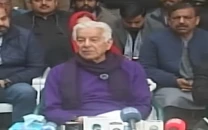Govt seeks to ban teacher strikes
Education secretary warns teachers of dire consequences

PHOTO: FILE
According to an official handout issued on Tuesday, the provincial government has decided to send striking teachers to prison for one year and slap a fine of Rs100,000 on those protesting and calling strikes in government educational institutes.
During the course of strike, the resignation tendered as protest by the member of the education service to the competent authority shall not be accepted and such members of the service shall be liable to disciplinary actions and penalties as prescribed under the Balochistan employee efficiency and discipline act 2001, adds the statement.
Senate panel irked by delay in provision of funds
In an interview with private news channel, Education Secretary Tayab Lehri said the provincial government has been paying keen attention to the education sector. Therefore, he said, the government intends to introduce a new educational act 2018.
“The new act bars government teachers from calling strikes and holding protests in educational institutions or they will face consequences,” said Lehri.
Reacting to the development, the teacher associations have rejected the act and announced protest outside the provincial assembly.
“We assume that the provincial government seeks to suppress the voice of teachers’ union imposing bureaucracy’s rule in provincial affairs,” Balochistan Professor and Lectures Association President Prof Agha Zahid said. The association gives no value to such acts, he added.
He also said all unions in Balochistan have unanimously announced a matching response to the government move. The body has decided to launch a movement against proposed new educational act.



















COMMENTS
Comments are moderated and generally will be posted if they are on-topic and not abusive.
For more information, please see our Comments FAQ